Affiliate links on Android Authority may earn us a commission. Learn more.
Android 11 will make 5G even more confusing
Published onMay 21, 2020

With 5G networks and phones becoming more common by the day, Google has revealed how it’ll display 5G network icons on your phones with Android 11.
Google’s updated icons will help users tell the difference between sub-6GHz 5G, mmWave 5G, and LTE Advanced Pro networks. The new iconography will be as follows.
- LTE
- LTE with carrier aggregation (LTE+)
- Advanced pro LTE (5Ge)
- sub-6GHz (5G)
- mmWave (5G+)
These 5G categorizations might seem like a jumbled mess right now, but let’s try put things into perspective.
Different types of 5G and where US carriers stand
Sub-6GHz 5G networks such as those of AT&T and T-Mobile have wider coverage than say Verizon’s mmWave “Ultra Wideband” network. But mmWave 5G is generally faster than sub-6Ghz, even though they travel shorter distances. You can read more about how exactly 5G works in our explainer post here.
Currently in the US, Verizon only offers mmWave 5G to consumers on phones like the OnePlus 8 5G (UW), LG V60 ThinQ 5G (UW) or the Galaxy S20 Plus/Ultra (UW). The ‘UW’ denotes Verizon’s Ultra Wideband network (their branding for mmWave) so these phones work on the mmWave spectrum and should show the 5G+ icon with Android 11.

AT&T offers both sub-6GHz and mmWave 5G to consumers, but the coverage of the latter on its network is limited. AT&T also offers a controversial 5Ge connection, which stands for 5G Evolution. However, it’s a rebranded 4G LTE-A network with slightly faster speeds than basic LTE.
AT&T has been heavily criticized by the telecom industry for misleading consumers into believing they have some sort of 5G technology when they see the 5Ge network icon on their phones. But the service provider has now agreed to drop the 5Ge branding, at least from it’s advertisements. On the flip side, Google’s decision to retain the 5Ge network icon suggests that you’ll probably still see it on your AT&T phones.
Coming to T-Mobile, most of its 5G coverage is handled by sub-6Ghz tech, although it does have mmWave 5G in some areas. So you’re far more likely to see the 5G icon on your T-Mobile phone instead of 5G+, unless the company decides to expand mmWave coverage down the line.